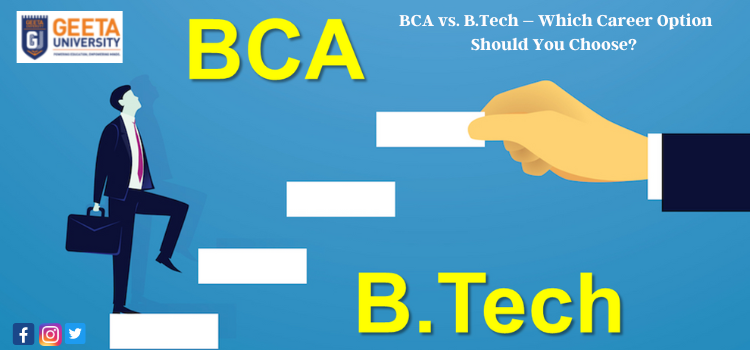
BCA vs. B.Tech – Which Career Option Should You Choose? – Geeta University
In the modern world, two industries that are crucially vital are technology and computer applications. In today’s technologically advanced culture, many academics have opted to work in disciplines that are influenced by different schools of science. Science students may find it challenging to decide what to study in the future.
Tech-savvy students frequently choose between a BCA and a B.Tech. Every course has unique characteristics and benefits, therefore it is essential to be aware of them before choosing one. This blog seeks to give readers a thorough understanding of the two courses and their main distinctions.
What is BCA?
The BCA, or Bachelor of Computer Applications, undergraduate course broadens the students’ understanding of computer language. Its scope includes computer programming and software development. Computer science, which teaches pupils about hardware, software, programming, and other related disciplines, is its cornerstone. The numerous computer-related content is highlighted.
Theoretical learning includes lessons on operating systems, computer science, programming languages, and statistical analysis. As part of the course’s practical component, students will build and maintain computer programmes using a range of tools and methods.
Despite having a huge number of other subjects that make up its curriculum, the BCA’s focus is entirely on computer science and includes the following disciplines as a fundamental feature of its curriculum:
- Digital devices
- Computer Networks
- C Programming
- Java Programming
- Operating System
What is B.Tech?
A number of private engineering universities in Rajasthan that are affiliated with the private sector provide the prestigious Bachelor in Technology (B. Tech) technical engineering degree programme to undergraduate candidates following four years of demanding coursework and practical experience. It provides a range of specialisations, including those in mechanical, chemical, civil, biotechnology, and other fields, allowing students to select a field that interests them.
In general, a Bachelor of Technology programme offers a wide education in a variety of engineering specialties as well as other branches of science and mathematics.
When doing the B.Tech programme, students have a number of specialties to choose from. As a result, depending on the specialisation, the course content varies. Depending on their preference or area of concentration, a student may decide to pursue one form of B.Tech degree. Several B.Tech programme examples are provided below:
- B.Tech. – Civil Engineering
- B.Tech. – Computer Science & Engineering
- B.Tech. – Computer Science & Engineering (Artificial Intelligence)
- B.Tech. – Electrical Engineering
- B.Tech. – Mechanical Engineering
What are the Eligibility Criteria?
Both degrees, in disciplines that are very popular today, have prerequisites that applicants must fulfill in order to be admitted to the programme. Since both degrees are undergraduate, the students must have successfully finished their 10+2 requirements and earned the minimum marks demanded by the educational institutions.
B.Tech.
Candidates must fulfill the following criteria in order to be admitted to the B.Tech programme:
finishing their 10+2 levels or an equivalent course from a reputed Indian board like ISC, CBSE, or WBCHSE
Mathematics, physics, and chemistry were required to be learned since these were the three main courses in the 10+2 levels.
For admission to some engineering universities, candidates must have passed National-Level exams like JEE (Not mandatory)
BCA
To be accepted into the BCA program, applicants must fulfill the following requirements:
finish their 10+2 levels or an equivalent course from an Indian board that is recognized, such as ISC, CBSE, or WBCHSE.
Computer science or application has to be studied as a required or elective subject during the 10+2 levels. Having them is still beneficial even if some universities do permit applicants to enroll without them.
For BCA students, certain Indian institutions have entrance exams, but the standards differ amongst institutions.
What are the career options?
B.Tech:
Candidates who hold a B.Tech in Computer Science or Information Technology have countless job options to consider, including those in software development, gaming, blockchain technology, the FinTech industry, software testing, mobile application development, and the computer hardware sector. The majority of the time, top IT and digital technology companies offer students enticing incentives to choose them during university recruiting efforts.
BCA:
There are numerous work prospects for BCA graduates. Careers in digital marketing, artificial intelligence, web development, technical support, data analysis, software publishing, etc. are available to students.
B.Tech with Geeta University:
AICTE-approved One of the top affiliated private engineering universities in Haryana is Geeta University of Engineering (Geeta University). The Institute has retained its reputation for offering a warm learning atmosphere that complies with international standards. It offers B-Tech Degree programs in mechanical engineering, electrical engineering, computer science engineering, and civil engineering. The Institute provides top-notch facilities, state-of-the-art labs, and a beautifully landscaped campus to promote an academic environment that is intellectually challenging.
Geeta University provides B.Tech degree programs in the following five engineering specialties:
- B.Tech. in Civil Engineering
- B.Tech. in Computer Science & Engineering
- B.Tech. in Computer Science & Engineering (Artificial Intelligence)
- B.Tech. in Electrical Engineering
- B.Tech. in Mechanical Engineering
Therefore, Geeta University is the ideal starting point for students wishing to pursue a career in engineering and study B.Tech at the best engineering university in Rajasthan.
Conclusion:
BCA and B.Tech both have advantages and disadvantages. Being a more professional school, B.Tech clearly has an advantage in the corporate sector. However, over time, the percentage of BCA students hired by IT firms has also been continuously increasing. Students interested in and want to pursue a career in developing computer programs and languages should strongly consider the BCA program.
However, the B.Tech program offers additional specializations that might meet students’ interests. The B.Tech degree provides a variety of specializations, including computer science engineering, and information technology.
One of the biggest advantages of choosing BCA over B. Tech is the duration of the degree. BCA is a better choice if the student is eager to finish their education quickly and work because it is a 3-year degree.
Related Posts
Forensic Odontology: Investigating Beyond the Bite
Forensic odontology, a fascinating field at the intersection of dentistry and law enforcement, plays a crucial role in solving crimes and identifying individuals when traditional

Benefits of B.Com After 12th – Geeta University
Benefits of B.Com After 12th – Geeta University Bachelor of Commerce, commonly known as B.Com, is one of the most popular undergraduate courses among students
NUTRIENT MANAGEMENT – A WAY FORWARD FOR ENHANCING PRODUCTIVITY AND IMPROVING SOIL FERTILITY
Agriculture plays a vital role in global food security, and ensuring sustainable practices is crucial for meeting the increasing demand for food. Integrated Nutrient Management


